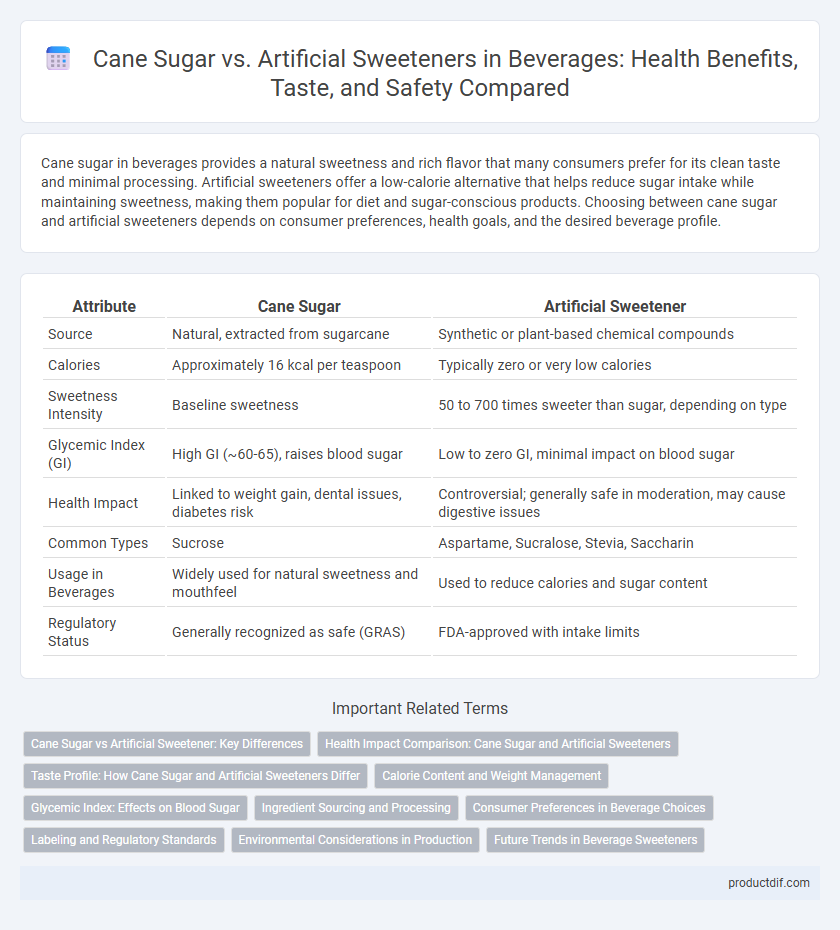Cane sugar in beverages provides a natural sweetness and rich flavor that many consumers prefer for its clean taste and minimal processing. Artificial sweeteners offer a low-calorie alternative that helps reduce sugar intake while maintaining sweetness, making them popular for diet and sugar-conscious products. Choosing between cane sugar and artificial sweeteners depends on consumer preferences, health goals, and the desired beverage profile.
Table of Comparison
| Attribute | Cane Sugar | Artificial Sweetener |
|---|---|---|
| Source | Natural, extracted from sugarcane | Synthetic or plant-based chemical compounds |
| Calories | Approximately 16 kcal per teaspoon | Typically zero or very low calories |
| Sweetness Intensity | Baseline sweetness | 50 to 700 times sweeter than sugar, depending on type |
| Glycemic Index (GI) | High GI (~60-65), raises blood sugar | Low to zero GI, minimal impact on blood sugar |
| Health Impact | Linked to weight gain, dental issues, diabetes risk | Controversial; generally safe in moderation, may cause digestive issues |
| Common Types | Sucrose | Aspartame, Sucralose, Stevia, Saccharin |
| Usage in Beverages | Widely used for natural sweetness and mouthfeel | Used to reduce calories and sugar content |
| Regulatory Status | Generally recognized as safe (GRAS) | FDA-approved with intake limits |
Cane Sugar vs Artificial Sweetener: Key Differences
Cane sugar, a natural sweetener derived from sugarcane, contains sucrose and provides a rich, authentic taste with calories that contribute to energy intake. Artificial sweeteners, such as aspartame and sucralose, offer intense sweetness without calories, making them popular in low-calorie and sugar-free beverages. Unlike cane sugar, artificial sweeteners do not impact blood glucose levels significantly, which is crucial for diabetic-friendly beverage formulations.
Health Impact Comparison: Cane Sugar and Artificial Sweeteners
Cane sugar, a natural sweetener, provides calories that contribute to energy intake but can increase the risk of obesity, type 2 diabetes, and heart disease when consumed in excess. Artificial sweeteners, including aspartame, sucralose, and stevia, offer low-calorie alternatives that may aid in weight management but have been debated for potential impacts on gut microbiota and metabolic health. Studies indicate moderate consumption of cane sugar and artificial sweeteners is generally safe, yet individual responses vary, necessitating personalized dietary choices for optimal health outcomes.
Taste Profile: How Cane Sugar and Artificial Sweeteners Differ
Cane sugar delivers a rich, natural sweetness with a smooth, full-bodied taste that enhances beverage flavors without aftertaste. Artificial sweeteners often provide a more intense sweetness but can introduce bitter or metallic notes, impacting the overall flavor balance. The difference in taste profile affects consumer preference and beverage formulation, with cane sugar favored for authentic flavor and artificial sweeteners chosen for calorie reduction.
Calorie Content and Weight Management
Cane sugar contains approximately 16 calories per teaspoon, contributing to higher calorie intake that can impact weight management negatively when consumed in excess. Artificial sweeteners, such as aspartame or sucralose, provide negligible or zero calories, making them popular alternatives for reducing overall caloric consumption. Choosing artificial sweeteners can support weight management goals by minimizing calorie intake while maintaining sweetness in beverages.
Glycemic Index: Effects on Blood Sugar
Cane sugar has a high glycemic index (GI) ranging from 60 to 65, causing rapid spikes in blood sugar levels after consumption. Artificial sweeteners such as aspartame, sucralose, and stevia have a negligible or zero glycemic index, minimizing blood glucose impact and making them suitable for people with diabetes or those managing blood sugar levels. Choosing artificial sweeteners over cane sugar can help stabilize blood sugar and reduce the risk of insulin resistance and related metabolic disorders.
Ingredient Sourcing and Processing
Cane sugar is derived from sugarcane plants, harvested and processed through extraction, purification, and crystallization to produce a natural sweetener rich in sucrose. Artificial sweeteners, such as aspartame, sucralose, and saccharin, are chemically synthesized in laboratories using compounds like amino acids or chlorinated sugars, ensuring high sweetness intensity with minimal caloric content. The sourcing of cane sugar involves agricultural cultivation and seasonal harvests, whereas artificial sweeteners rely on controlled chemical manufacturing processes independent of crop variability.
Consumer Preferences in Beverage Choices
Consumer preferences in beverage choices reveal a growing demand for natural ingredients, with cane sugar favored for its perceived purity and rich flavor profile. Artificial sweeteners appeal to health-conscious consumers seeking low-calorie or sugar-free options, despite ongoing debates about their taste and potential health effects. Market data shows a trend toward transparency and clean labeling, influencing purchase decisions and shaping product formulations in the beverage industry.
Labeling and Regulatory Standards
Cane sugar and artificial sweeteners are subject to distinct labeling and regulatory standards set by agencies such as the FDA and EFSA, requiring clear identification of each sweetener type on beverage packaging. Cane sugar must be labeled with its common name, while artificial sweeteners like aspartame, sucralose, and stevia require specific disclosure due to their synthetic nature and potential health impact warnings. Compliance with these regulations ensures consumer transparency, aiding informed choices regarding caloric content, glycemic index, and potential allergen risks in beverages.
Environmental Considerations in Production
Cane sugar production involves intensive water use, deforestation, and soil degradation, contributing significantly to environmental concerns like habitat loss and carbon emissions. Artificial sweeteners generally have a lower environmental footprint, requiring less land and water during manufacturing processes. However, the synthetic chemical production of artificial sweeteners can lead to waste and pollution challenges, necessitating sustainable waste management practices.
Future Trends in Beverage Sweeteners
The future of beverage sweeteners is shifting toward natural alternatives like cane sugar due to growing consumer demand for clean-label products and health-conscious options. Innovations in biotechnology are driving the development of next-generation natural sweeteners that offer the sweetness of cane sugar without the calories and glycemic impact. Market trends indicate a significant increase in the adoption of plant-based and fermentation-derived sweeteners, positioning them as key players alongside traditional artificial sweeteners in the evolving beverage industry.
Cane Sugar vs Artificial Sweetener Infographic

 productdif.com
productdif.com